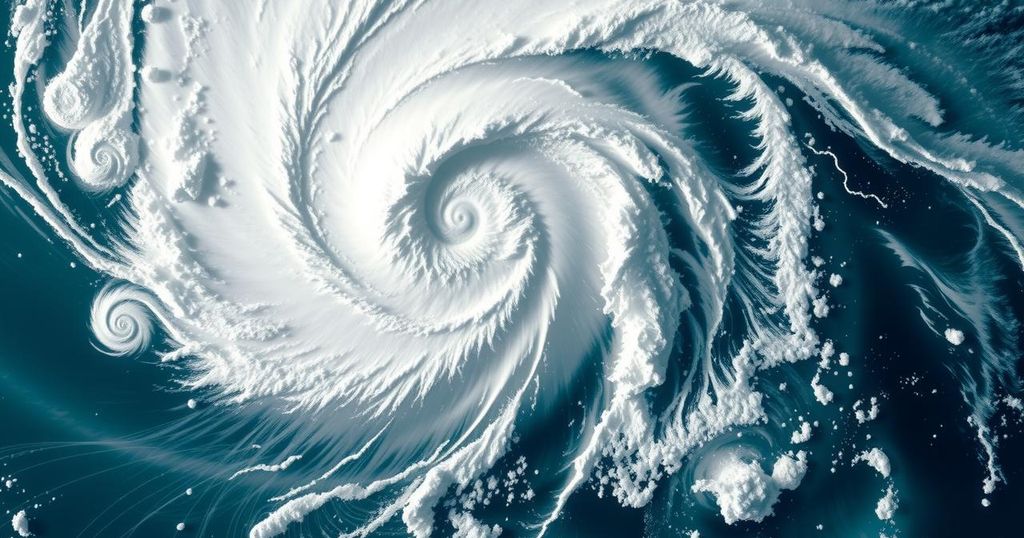Tropical Cyclone Chido Strikes Mayotte: A Grave Human and Environmental Toll
Tropical Cyclone Chido devastated Mayotte on December 14, 2023, with wind speeds exceeding 200 km/h. The storm, which produced torrential rain and high waves, led to a national mourning declaration by President Macron amid fears of substantial casualties. Météo-France’s timely warnings preceded the cyclone, though significant loss of life was reported. Chido subsequently weakened over Mozambique, causing further rainfall impacts. The storm’s rarity highlights the vulnerability of smaller islands to severe weather events.
On December 14, 2023, Tropical Cyclone Chido struck Mayotte, generating winds exceeding 200 km/h and gusts surpassing 225 km/h. This cyclone was deemed the most powerful to hit the island in 90 years, based on assessments from Météo-France. Accompanied by torrential downpours totaling 176 mm in just 12 hours and treacherous seas with average wave heights exceeding 5 meters, the cyclone inflicted significant damage, even destroying some of the observational infrastructure of Météo-France itself.
In response to the disaster, French President Emmanuel Macron declared a national day of mourning. A large-scale emergency response was initiated amid fears of substantial fatalities, particularly due to the high prevalence of informal housing in Mayotte, which is not accustomed to such severe tropical cyclones. Despite timely and specific alerts issued by Météo-France over 50 hours prior to the storm, the loss of life was substantial.
The forecasts began with an amber alert issued on the morning of December 13, escalating to a red alert later that evening, and finally to a rare violet alert on the morning of December 14. Chido followed an atypical route, bypassing the larger island of Madagascar, which could have weakened its intensity. Consequently, it made direct landfall on Mayotte, completely enveloping the island within the cyclone’s eye.
Following its impact on Mayotte, Chido continued onto Mozambique on December 15, where it began to weaken but still brought significant rainfall to both Mozambique and Malawi. Météo-France remarked on the complexity of assessing climate change’s role in Chido’s characteristics, indicating that the cyclone’s impact related more critically to its trajectory and direct strike on Mayotte. They stated, “The impacts of Chido are above all due to its track and the direct hit on Mayotte. This is an extremely rare event not seen for 90 years. Our current state of knowledge doesn’t allow us to draw any conclusions about the role of climate change on the track of the cyclone and on its intensity.”
As the cyclone season for the South-West Indian Ocean progresses, Météo-France highlighted that its seasonal forecast, announced on October 31, had predicted an early onset for cyclone activity in the 2024-2025 season. Historically, impactful cyclones had only begun in January during the last three seasons, but this forecast indicated potential early impacts before the year’s end. The forecast anticipates a range of 9 to 13 systems, with a projection that four to seven may attain cyclone classification.
Tropical cyclones are significant meteorological events that pose severe risks to coastal regions, particularly in tropical and subtropical areas. The Indian Ocean region, especially around islands like Mayotte, is vulnerable to such storms, especially given their unique environmental and geographic features. Cyclones can lead to devastating consequences, including loss of life, destruction of infrastructure, and disruptions to local economies and ecosystems. Accurate forecasting and effective emergency response systems are crucial to mitigating these impacts, especially in regions that are not frequently subjected to such intense storms. In the case of Tropical Cyclone Chido, the island’s lack of preparation for such high-impact weather events highlighted the urgent need for enhanced resilience measures against natural disasters.
In conclusion, Tropical Cyclone Chido has made a profound impact on Mayotte, marking the strongest storm to hit the island in nearly a century. The loss of life and destruction caused by the cyclone underscored the vulnerability of Mayotte’s informal housing and its limited experience with such intense cyclonic activity. Timely forecasts and alerts were issued, yet the response challenges in the face of unexpected natural disasters remain apparent. As the region prepares for the upcoming cyclone season, it is vital to strengthen disaster preparedness and response strategies to safeguard communities against future extreme weather events.
Original Source: wmo.int




Post Comment